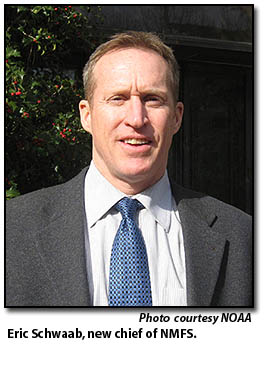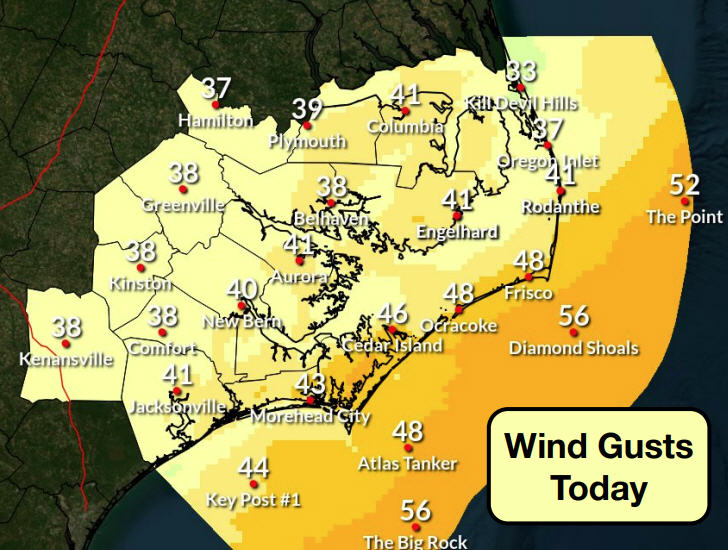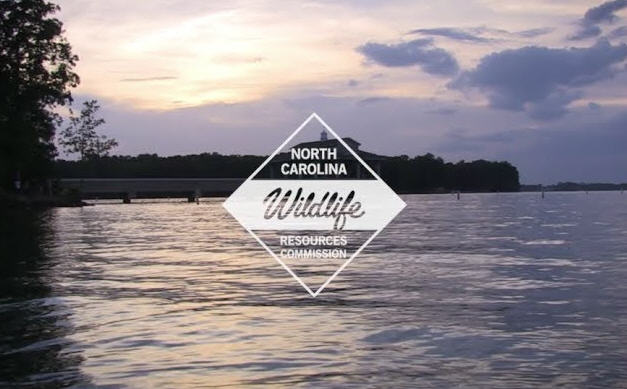Eric Schwaab is the new chief at National Marine Fisheries

By SUSAN WEST
By SUSAN WEST
Eric Schwaab, the new chief at National Marine Fisheries Service, is stepping into the job at a time when frustration with federal fisheries policy is bubbling over in coastal towns from Maine to Alaska.
Schwaab was sworn in as the assistant administrator for fisheries in the National Oceanic and Atmospheric Administration (NOAA) on Feb. 16, only a little more than one week before commercial and recreational fishermen stage a protest rally in Washington, D.C. That rally is scheduled for Wednesday, Feb. 24, at the U.S. Capitol.
Fishermen are asking Congress to revisit the Magnuson Stevens Fishery Conservation and Management Act, the framework for federal fisheries management. The law sets out a time schedule for rebuilding fish stocks that is rigid enough that regulators must ban fishing for some species altogether, resulting in what fishermen describe as irreparable damage to coastal economies and communities.
Fishermen hope the D.C. rally galvanizes Congressional support for legislation amending Magnuson so that rebuilding schedules can be extended and negative economic impacts lessened.
Schwaab will need to restore confidence in the National Marine Fisheries Service (NMFS) law enforcement branch. Congress has scheduled hearings into failings and abuses within the branch that were identified in an investigation by the Inspector General at the U.S. Commerce Department.
Schwaab should probably anticipate growing opposition in small communities to catch-share programs as regulators move ahead with market-based management in more fisheries. In catch-share programs, the government allocates harvest shares, or individual fishing quotas, to fishermen based on their past landings, and then lets the market for buying and leasing shares sort out which fishermen will be able to fish.
Small boat fleets and small fishing villages worry that market-based management would result in U.S. fisheries going the way of agri-business and question the Obama administration’s commitment to protecting Main Street jobs and economies.
One of those places is Hatteras Island, a place Schwaab is familiar with from summer vacations that have included charter-boat fishing trips.
Schwaab said the starting point for healing the rupture between the federal agency and the people it serves is improving communication.
“One priority will be improving outreach with recreational and commercial fishermen all around the country,” he said during a teleconference with reporters shortly after his swearing-in ceremony.
He expressed confidence that the deep distrust of the agency would diminish as the data and the science used by managers to craft management plans and fishing regulations improved.
Schwaab noted that accurate and timely data comes from a variety of sources, including cooperative research where scientists and fishermen team up together to collect biological data or test modifications to fishing gear.
Unfortunately, federal and state budget proposals jeopardize that type of research. The NOAA budget for Fiscal Year 2011 reduces funding for cooperative research by $6 million, about half of last year’s budget, and rolls that money into the agency’s catch-share implementation program.
Cooperative research in North Carolina is also facing an uncertain future. The North Carolina Department of Environment and Natural Resources has proposed eliminating funds for the state Fishery Resource Grant program for the upcoming fiscal year. The agency would use the $600,000 to offset budget reductions at the Division of Marine Fisheries and to implement a sea turtle observer program.
Since January, 2008 when NMFS chief Bill Hogarth resigned, Jim Balsiger, Alaska regional NOAA fisheries administrator, has lead NMFS. Many observers last summer expected NOAA head Jane Lubchenco to appoint either University of Massachusetts marine science professor Brian Rothschild or legislative assistant Arne Fuglvog from Alaska to the post.
Schwaab’s career has been centered at the Maryland Department of Natural Resources in various positions. Most recently he was deputy secretary of the department.
Subject
Name
(required, will not be published)
(required, will not be published)
City :
State :
Your Comments:
May be posted on the Letters to the Editor page at the discretion of the editor.
May be posted on the Letters to the Editor page at the discretion of the editor.
May be posted on the Letters to the Editor page at the discretion of the editor.
May be posted on the Letters to the Editor page at the discretion of the editor.

















